The large majority of police officers, firefighters and EMTs are men—underscoring the importance in the industry for Men’s Health Month (November). What’s more, men in these occupations—and in general—are at a higher risk for several health issues both mental and physical. Read on for surprising statistics about male first responder health issues, and in general.
First-responder men’s health statistics
83.2% of police officers are men
First responders had a 31.9% increase in fatalities in 2021
The life expectancy for police officers is just 57 (about 20 years less than the general population)
First responders over the age of 45 are at an 18x increased risk for sudden cardiac arrest
Police officers are at an increased risk of physical injuries, cardiovascular issues and more
General statistics about men’s health
Men have shorter life spans than women; in fact, by age 85, women outnumber men 2.6 to 1.
Men are 10 times more likely to get inguinal hernias than women
Men are 5 times more likely to have aortic aneurysms than women
Men are twice as likely to suffer from emphysema than women
Men are more likely to die from COVID-19 than women
About 30% more men die from diabetes than women
Men are more likely to die from cancer than women
72 percent of all motor vehicle fatalities were men
71 percent of pedestrian deaths are men
87 percent of cyclist deaths are men
92 percent of motorcyclist deaths are men
Women visit doctors at a 40% higher rate than men
Statistics about men’s mental health and addiction
Police officers and firefighters are more likely to die by suicide than in the line of duty
First responders are 1.39 times more likely to die by suicide than the general public
Men are nearly 4x more likely to die by suicide than women
Men are more than twice as likely to die from alcohol-related causes than women
Men are two to three times more likely to abuse drugs than women
Addiction among first responders
Research shows that 30 percent of first responders will experience mental health challenges, as compared with 20 percent of the general population. These issues—from depression to PTSD—have a high correlation with addiction issues.
Like mental health itself, addiction is not a behavioral issue; rather it is a chronic disease that affects neurotransmission in the brain’s reward centers, leading to addictive behaviors. Without treatment or involvement in a recovery process, addiction is a progressive condition that may result in disability or even death. These addictive behaviors often replace healthy ones.
If you or someone you know is struggling with addiction or other mental health issues, 10-4 Medical can help.
From workplace injuries and health condition screening to mental health support and primary care, 10-4 Medical is a full-service medical provider dedicated solely to first responders and their families. Our services are available on-site, 24/7, ensuring convenient, accessible care with no-surprise pricing and no hidden costs. Contact us to learn more.


